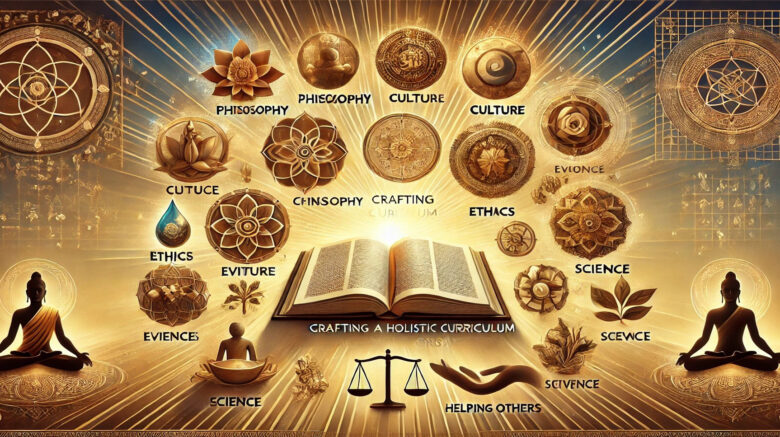In today’s fast-paced and fragmented world, preserving and propagating the timeless values of Sanatan Dharma is essential for fostering a harmonious, sustainable, and enlightened society. Rastriya Sanatan Sangathan has a unique role to play in this endeavour by creating a curriculum that combines philosophy, culture, ethics, and practical skills. Below is a comprehensive curriculum outline, along with proposed actions to ensure its effective implementation.
Philosophy and Spirituality
Objective: To inculcate an understanding of Sanatani principles and promote inner peace.
Understanding Sanatani principles and promoting inner peace can be achieved through regular classes on foundational concepts like Dharma, Karma, and Moksha. Study groups for sacred texts such as the Bhagavad Gita, Upanishads, and Ramayana should be organized. Additionally, guided meditation and yoga workshops can help instil self-awareness and mindfulness. Hosting interfaith dialogues would further promote mutual respect and understanding among diverse communities.
Culture and Heritage
Objective: To reconnect individuals with their roots and preserve the rich tapestry of Indian traditions.
Reconnecting individuals with their roots and preserving the rich tapestry of Indian traditions are crucial. Language courses in Sanskrit and regional Indian languages can facilitate this, along with cultural festivals showcasing traditional art, music, and dance. Workshops on Indian temple architecture and its historical significance, coupled with the promotion of traditional rituals and the spiritual significance of Sanatani festivals, would ensure a deeper appreciation of cultural heritage.
Ethics and Moral Education
Objective: To nurture responsible and ethical individuals
Nurturing responsible and ethical individuals requires character-building programs focusing on honesty, compassion, and self-discipline. Leadership training rooted in humility and service should be prioritized, while family counselling sessions can help strengthen familial bonds and societal harmony.
Environment and Sustainability
Objective: To inspire a lifestyle in harmony with nature
Inspiring a lifestyle in harmony with nature can be achieved through tree plantation drives and clean-up campaigns. Teaching organic farming and sustainable agriculture practices is essential, as is promoting eco-friendly living through workshops on reducing waste and conserving resources. Celebrating events like Van Mahotsav and Earth Day with Dharmic perspectives on nature conservation can reinforce these values.
Science and Knowledge Systems
Objective: To revive ancient Indian contributions to science and integrate them with modern knowledge.
Reviving ancient Indian contributions to science and integrating them with modern knowledge can be achieved by hosting lectures on ancient advancements in mathematics, astronomy, and medicine. Introductory courses on Ayurveda and its practical applications, as well as Vaastu Shastra principles in architecture workshops, would be beneficial.
Community Service and Social Welfare
Objective: To serve society selflessly and uplift marginalized communities.
Publishing articles and research papers highlighting the relevance of traditional sciences today would further spread awareness. Serving society selflessly and uplifting marginalized communities can be realized by organizing free health camps, blood donation drives, and food distribution programs. Literacy and vocational training programs for underprivileged sections should be established. Creating women’s empowerment forums focusing on education, self-reliance, and leadership would ensure inclusive growth.
Leadership and Civic Engagement
Objective: To cultivate socially responsible citizens.
Cultivating socially responsible citizens involves conducting workshops on constitutional duties and Dharmic citizenship. Teaching conflict resolution strategies based on non-violence and dialogue, and training community members in grassroots organizing and collective problem-solving, can contribute to civic engagement.
History and Social Studies
Objective: To provide a balanced and inclusive understanding of India’s heritage.
Providing a balanced and inclusive understanding of India’s heritage requires developing courses on Bharatiya Itihasa, emphasizing unsung heroes and cultural milestones. Exhibitions and field trips to heritage sites can bring history to life while documenting and promoting indigenous practices and crafts would preserve traditional knowledge. Tracing the global influence of Sanatani traditions through interactive seminars can highlight their universal appeal.
Personal Development
Objective: To equip individuals with life skills and emotional resilience.
Equipping individuals with life skills and emotional resilience involves introducing time management techniques inspired by ancient wisdom and offering stress management sessions incorporating Pranayama and Dhyan. Organizing debates and discussions can enhance critical thinking and communication skills.
Practical Skills and Workshops
Objective: To make individuals self-reliant and skilled in traditional practices.
Making individuals self-reliant and skilled in traditional practices is achievable through hands-on workshops in crafts like pottery, weaving, and cooking. Teaching basic survival skills, including natural resource management and first aid, along with Dharmic etiquette training covering traditional greetings, dressing, and social conduct, can create well-rounded individuals.
Implementation Framework
- Structured Curriculum: Design a modular curriculum with beginner, intermediate, and advanced levels for all subjects.
- Qualified Trainers: Engage experts and scholars in Sanatani philosophy, history, and sciences.
- Digital Platforms: Utilize online platforms for virtual classes, webinars, and e-learning modules.
- Community Centers: Establish centres for in-person workshops, cultural events, and meditation retreats.
- Outreach Programs: Partner with schools, colleges, and other organizations to expand reach.
By addressing diverse aspects of Sanatani philosophy, culture, and practical living, this curriculum aims to empower individuals to lead meaningful lives while contributing to societal harmony. Through these initiatives, Rastriya Sanatan Sangathan can play a transformative role in bridging the gap between ancient wisdom and modern challenges.

